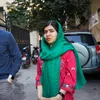On Malala Day, here are 5 things young people can learn from Malala Yousafzai’s activism
As Malala turns 22 today, we take a look at five aspects of her activism that young people can learn and implement in their lives.

Malala Yousafzai
In 2008, Malala Yousafzai started writing about the rising influence of Taliban in Pakistan for BBC Urdu, under a pseudonym.
She gained worldwide recognition when she was shot in the head by a Taliban gunman in 2012.
At 15, Malala had become the extremist group's target after publicly speaking about girls having the right to education, and was attacked on her way home from school.
Recovering from her injuries in a hospital in Birmingham a year later, Malala decided to continue fighting for girls' education and started the Malala Fund along with her father, Ziauddin Yousafzai, in 2013.
Through the Fund and its network of 'education champions,' Malala has been reaching out to girls around the world, sharing their stories and helping them fight oppression.
Today the 22-year-old student of Philosophy, Politics, and Economics at the University of Oxford is a household name in the fight for women’s rights.
On her birthday, recognised as Malala Day, we look at five things today’s youth can learn from Malala’s life of activism.
Take initiative
Everybody wants the world to change, but most shy away from taking initiative. Malala’s activism began at 11, when she stepped up to address her country about the Taliban taking away girls’ right to education.
In September 2008, she gave her first public speech at a local press club in Peshawar, saying “How dare the Taliban take away my basic right to education?” After this, she also started writing for BBC Urdu under the pseudonym 'Gulmakai', about her experiences in Swat Valley, which was under attack by the Taliban. Several of her pieces were also translated into English.
Don’t back down
It’s easy to back away from the spotlight and lead a quiet life when things get difficult. Although making huge strides is time-consuming and demanding, it’s important to keep going.
When Malala was shot in 2012, the world watched as she fought for her life. Once she recovered, she chose not to retreat into anonymity, but continue her activism for girls’ education, and launched the Malala Fund.
“There will always be hurdles in life, but if you want to achieve a goal, you must continue,” she says.
Age is not a barrier
People may try to bring you down because of your age, but being young is an advantage when it comes to making a change. Malala started her activism as a 11-year-old, and today, at 22, continues to make a difference.
In 2013, on her 16th birthday, Malala addressed the United Nations for the first time. In 2014, she became the youngest-ever Nobel laureate, when she was awarded the Nobel Peace Prize for her work in restoring girls’ right to education. Between 2013 and 2018, Malala also released three books - I Am Malala, Malala’s Magic Pencil, and We Are Displaced.
Although she entered her 20s, Malala has already reached several impactful milestones, and her journey continues to inspire many around the world.
Rise above your circumstances
While one may feel stuck in certain situations or the existing environment, taking those steps towards a better tomorrow will go a long way. Tell yourself you can do anything you put your mind to, and you will reach heights you never imagined you could.
Although Malala hails from Swat Valley, where girls’ right to education was being stripped away, she did not stay quiet. Fully aware of the dangers she would be in, Malala still spoke out against the injustice she and hundreds of other girls were facing. Her efforts have played a pivotal role in restoring peace in the district.
Amplify other voices
Activism, or making any kind of difference, is not about one person; it’s the voice of a collective. To make an impact, it’s crucial to be inclusive and pass the mic to those who need it.
Through her activism, she meets several other girls who face oppression, and retells their stories to the world. A good example would be her book, I Am Displaced, in which she shares the experiences of refugee girls around the world.
“I tell my story not because it is unique, but because it is the story of many girls,” says Malala.
(Edited by Rekha Balakrishnan)











